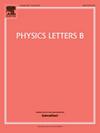作为宇宙膨胀加速器的太初黑洞
IF 4.5
2区 物理与天体物理
Q1 ASTRONOMY & ASTROPHYSICS
引用次数: 0
摘要
我们提出了一种由原始黑洞(PBHs)驱动的具有排斥行为的宇宙加速的新颖而自然的机制。使用一种新的“瑞士奶酪”宇宙学方法,我们通过检查三个规则的黑洞时空——即海沃德时空、巴丁时空和戴姆尼科娃时空——以及奇异的德西特-史瓦西时空,证明了这种宇宙加速机制是一种普遍现象。有趣的是,通过将这些黑洞时空与各向同性和均匀膨胀的宇宙相匹配,我们得到了一个宇宙加速阶段,该阶段结束于黑洞参数特征的能量尺度或由于黑洞蒸发。这种宇宙加速机制可能与一个优雅的退出和再加热的暴胀阶段有关,也可能与哈勃张力相关的早期暗能量类型的贡献有关。值得注意的是,我们发现质量为m<;5×108g的超轻pbh在大爆炸核合成之前主导着宇宙的能量含量,可以在不使用暴胀场的情况下推动一个成功的暴胀膨胀时代。此外,质量为m ~ 1012g,丰度为0.107<;ΩPBHeq<;0.5的PBHs,略低于物质-辐射相等,可以产生大量的早期暗能量,有助于缓解H0张力。本文章由计算机程序翻译,如有差异,请以英文原文为准。
Primordial black holes as cosmic expansion accelerators
We propose a novel and natural mechanism for cosmic acceleration driven by primordial black holes (PBHs) exhibiting repulsive behavior. Using a new “Swiss Cheese” cosmological approach, we demonstrate that this cosmic acceleration mechanism is a general phenomenon by examining three regular black hole spacetimes - namely the Hayward, the Bardeen and the Dymnikova spacetimes - as well as the singular de Sitter-Schwarzschild spacetime. Interestingly, by matching these black hole spacetimes with an isotropic and homogeneous expanding Universe, we obtain a phase of cosmic acceleration that ends at an energy scale characteristic to the black hole parameters or due to black hole evaporation. This cosmic acceleration mechanism can be relevant either to an inflationary phase with a graceful exit and reheating or to an early dark energy type of contribution pertinent to the Hubble tension. Remarkably, we find that ultra-light PBHs with masses dominating the energy content of the Univese before Big Bang Nucleosynthesis, can drive a successful inflationary expansion era without the use of an inflaton field. Additionally, PBHs with masses and abundances , slightly before matter-radiation equality, can produce a substantial amount of early dark energy, helping to alleviate the tension.
求助全文
通过发布文献求助,成功后即可免费获取论文全文。
去求助
来源期刊

Physics Letters B
物理-物理:综合
CiteScore
9.10
自引率
6.80%
发文量
647
审稿时长
3 months
期刊介绍:
Physics Letters B ensures the rapid publication of important new results in particle physics, nuclear physics and cosmology. Specialized editors are responsible for contributions in experimental nuclear physics, theoretical nuclear physics, experimental high-energy physics, theoretical high-energy physics, and astrophysics.
 求助内容:
求助内容: 应助结果提醒方式:
应助结果提醒方式:


